Abstract
ALTHOUGH it had been observed that strains of Bacillus pumilus produce substances with antibacterial activity, very little work has been done to isolate these substances. Gilliver1 observed the antibacterial activity of strains of B. pumilus, but made no attempt to isolate the active principles. Dvonch and Benedict2 isolated an antibacterial agent from a strain of B. pumilus which they showed to be similar to subtenolin, an antibiotic from B. subtilis. Borowski and others3 obtained an antibiotic, tetaine, from a strain of B. pumilus.
This is a preview of subscription content, access via your institution
Access options
Subscribe to this journal
Receive 51 print issues and online access
$199.00 per year
only $3.90 per issue
Buy this article
- Purchase on Springer Link
- Instant access to full article PDF
Prices may be subject to local taxes which are calculated during checkout
Similar content being viewed by others
References
Gilliver, K., Brit. J. Exp. Path., 30, 214 (1949).
Dvonch, W., and Benedict, R. G., Antibiotics and Chemotherapy, 3, 192 (1953).
Borowski, E., et al., Chem. Abstracts, 47, 7,594 (1953); 48, 11,000 (1954).
Author information
Authors and Affiliations
Rights and permissions
About this article
Cite this article
BHATE, D. Pumilin, a New Antibiotic from Bacillus pumilus . Nature 175, 816–817 (1955). https://doi.org/10.1038/175816a0
Issue Date:
DOI: https://doi.org/10.1038/175816a0
This article is cited by
-
An Aminoglycoside Antibacterial Substance, S-137-R, Produced by Newly Isolated Bacillus velezensis Strain RP137 from the Persian Gulf
Current Microbiology (2019)
-
Genome Sequencing and Analysis of Bacillus pumilus ICVB403 Isolated from Acartia tonsa Copepod Eggs Revealed Surfactin and Bacteriocin Production: Insights on Anti-Staphylococcus Activity
Probiotics and Antimicrobial Proteins (2019)
-
Fermentation research in Nigeria
MIRCEN Journal of Applied Microbiology and Biotechnology (1988)
-
Nosiheptide, a sulfur-containing peptide antibiotic isolated fromStreptomyces actuosus 40037
Experientia (1980)
Comments
By submitting a comment you agree to abide by our Terms and Community Guidelines. If you find something abusive or that does not comply with our terms or guidelines please flag it as inappropriate.



